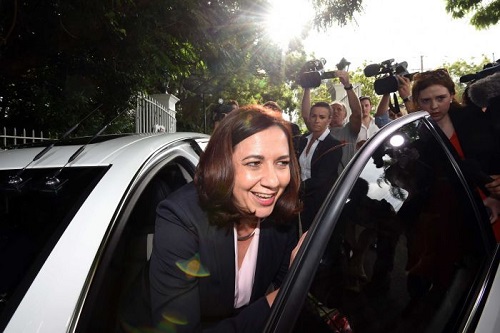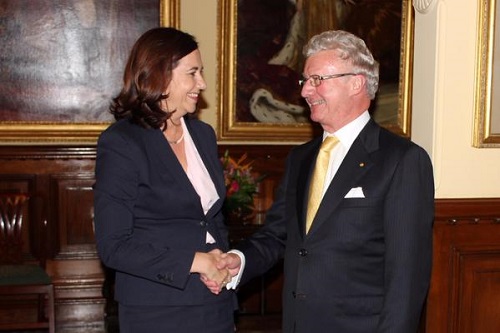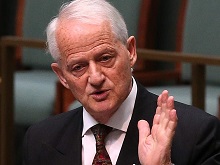
An open thread where, at your leisure, you can discuss anything you like, well, within reason and the Comments Policy. Include here news and views, plus any notable personal experiences from the week and the weekend.
For climate topics please use the most recent Climate clippings.
The gentleman in the image is Voltaire, who for a time graced the court of Frederick II of Prussia, known as Frederick the Great. King Fred loved to talk about the universe and everything at the end of a day’s work. He also used the salons of Berlin to get feedback in the development of public policy.
Fred would only talk in French; he regarded German as barbaric. Here we’ll use English.
The thread will be a stoush-free zone. The Comments Policy says:
The aim [of this site] is to provide a venue for people to contribute and to engage in a civil and respectful manner.
Here are a few bits and pieces that came to my attention last week.
1. Paluszczuk premier at last

Annastacia Palaszczuk has been invited to form government, with the interim ministry to be sworn in on Saturday. Most likely she will start with a couple of key ministers and wait for the arrival of the newly elected members before finalising her ministry.
Former Labor treasurer Terry Mackenroth has been assisting Palaszczuk in transitioning to Government. It was revealed yesterday that he has been assisting her for the last six months.
The Electoral Commission of Queensland (ECQ) has decided not to lodge a petition with the Court of Disputed Returns for the seat of Ferny Grove following additional legal advice.
ABC full Queensland election coverage is here. Ours is here.
Elsewhere at Overland Mark Bahnisch has written another brilliant article, wrapping the election.

[Update: Palaszczuk has announced her cabinet with 8/14 women. Leeanne Enoch, the first indigenous MP in Qld, will be Minister for Housing and Public Works, Minister for Science and Innovation.]
2. Brandis asked Gillian Triggs to resign
The attorney general sent the request to the human rights commission head in a move Labor called a ‘disgraceful attack’ on a statutory agency.
The Abbott government asked the president of the Australian Human Rights Commission, Gillian Triggs, to resign ahead of the publication of the commission’s critical report into children in detention.
Guardian Australia can confirm the resignation request, reported in the Age on Friday, and understands it was relayed to Triggs on behalf of the attorney general, George Brandis, by the secretary of his department, Chris Moraitis. It is understood that Triggs was offered another position in the same conversation.
Government backbenchers have also ramped up their public calls for her resignation and threatened a parliamentary inquiry into “bias” in her organisation.
Triggs is understood to have refused to resign from her position. She was appointed the president in July 2012 for a five-year term and can be removed for bankruptcy or serious misconduct only.
Max Chalmers at New Matilda says the coalition attacks on the Kids In Detention Report are irrational and wilfully blind.
The release of the report was always going to be accompanied by recrimination. For months the Coalition laid the groundwork, belting the Australian Human Rights Commission publicly and feeding material to The Australian newspaper, which gleefully conspired to trash an independent, public institution.
It was a pre-emptive strike inspired in part by pure malice, and in part by anticipation: they knew the report, which documents the impact of the bipartisan-backed policy of mandatory detention of children – would be devastating.
3. German higher education is free
John D brought this fact to my attention recently so I googled and here we have it:
From this semester [September 2014], all higher education will be free for both Germans and international students at universities across the country, after Lower Saxony became the final state to abolish tuition fees.
Education is the responsibility of 16 autonomous states in the German federation. There are 379 higher education institutions with about 2.4m students.
If they can do it, why can’t we?
4. Link between lead and violent crime
The last Catalyst program (series 16, episode 2) revealed that lead particles absorbed by children correlates with violent crime 22 years later. Australia, producing a large share of the world’s lead, has some hotspots, in Boolaroo, Broken Hill, Port Kembla, Port Pirie and Mt Isa. IQ is also negatively affected.
We were told that Australia’s permissible blood levels (10 micrograms per decilitre) were twice as high as those in the US and 625 times background levels.
There’s more at the ABC, at the BBC and at Mother Jones.
It seems that the general decline in violent crime around the world may be attributable in large part to regulations governing lead in petrol.
5. Health benefits of drinking
It’s a widely held view that a glass of red wine a day can be good for you. Unfortunately new research shows that not to be the case. Associate Professor Emmanuel Stamatakis from the University of Sydney:
we found that the protective effect reported previously in fact could be an artefact, a statistical artefact relating to the way the study was designed.
What we thought was an established fact turned out to be a methodological error:
The old methodology compared drinkers with non-drinkers. But ex-drinkers where also included in the group of people considered non-drinkers – some who had been directed to stop drinking alcohol for health reasons.
The new research compared drinkers to non-drinkers only, and consequently could not find any evidence that drinking in small amounts can be good for you.
Sorry!






